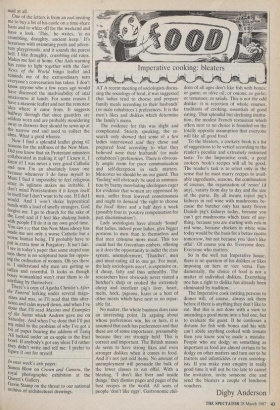Imperative cooking: bleaters
AT A recent meeting of sociologists discus- sing the sociology of food, it was suggested that ladies tend to choose and prepare family meals according to their husbands' (or male cohabitees') preferences. It is the men's likes and dislikes which determine the family's menu.
The evidence for this was slight and complicated. Strictly speaking, the re- search only showed that some of a few ladies interviewed said they chose and prepared food according to what they believed were their husbands' (or male cohabitees') preferences. There is obvious- ly ample room for poor communication and self-deception in such matters. Moreover we should be on our guard. This 'finding' will obviously be used as ammuni- tion by barmy men-hating ideologues eager for evidence that women are oppressed by men, suffer from lowered consciousness and ought to demand 'the right to choose the food' three and a half days a week (possibly four in 'positive compensation for past discrimination').
Lady sociologists have already `found' that ladies, indeed poor ladies, give bigger portions to men than to themselves and that men consume more meat. This too could fuel the Greenham embers, offering as it does the opportunity to indict the class system, unemployment, 'Thatcher', men and meat-eating all in one go. For meat, the lady sociologists assert, is expensive or, if cheap, fatty and thus unhealthy. The researchers have obviously never visited a butcher's shop or cooked the extremely cheap and excellent pig's liver, heart, melts, hock, pigeons, hares or a host of other meats which have next to no separ- able fat.
No matter, the whole business does raise an interesting point. In arguing about whose preferences win, his or hers, it is assumed that each has preferences and that these are of some importance, presumably because they are strongly held. This is correct and important. The British masses do seem to have strong likes and even stronger dislikes when it comes to food.
And it's not just odd items. No amount of unemployment will persuade the bulk of the lower classes to eat offal. With a bleating, 'I don't like liver and inside things,' they dismiss pages and pages of the best recipes in the world. All sorts of people 'don't like eggs'. Gastronomic chil- dren of all ages don't like fish with bones; or game; or olive oil; or onions; or garlic; or tomatoes; or salads. This is not the odd dislike: it is rejection of whole courses, traditions of cooking, essentials of good eating. That splendid but declining institu- tion, the modest French restaurant which offers next to no choice is founded on the totally opposite assumption that everyone will like all good food.
To the bleaters, a cookery book is a list of suggestions to be vetted according to the reader's peculiar and extremely restricted taste. To the Imperative cook, a good cookery book's recipes will all be good.
The reader's task is to select only in the sense that he must marry recipes to avail- able ingredients, seasons, the combination of courses, the organisation of `restes' (if any), variety from day to day and the size of the purse. By all means reject pig's kidneys in red wine with mushrooms be- cause the butcher only has nasty frozen Danish pig's kidneys today, because you can't get mushrooms which taste of any- thing, because you are starting with eels in red wine, because chicken in white wine today would be the basis for a better risotto tomorrow, but not because you 'don't like offal'. Of course you do. Everyone does. Everyone who matters.
So in the well run Imperative house, there is no question of his dislikes or likes imposing on hers or vice versa. Fun- damentally, the choice of food is not a matter of individual dislikes. Everything one has a right to dislike has already been eliminated by tradition.
The Imperative cook inviting persons to dinner will, of course, always ask them before if there is anything they don't like to eat. But this is not done with a view to amending a good menu into a bad one, but to evaluate the guest. If he confesses a distaste for fish with bones and his wife can't abide anything cooked with tomato then you know you've made a mistake.
People who are dodgy on something as important as food are almost certain to be dodgy on other matters and turn out to be traitors and infanticides or even sociolog- ists. If you make your enquiry in really good time it will not be too late to cancel the invitation, invite someone else and send the bleaters a couple of luncheon vouchers.
Digby Anderson


















































 Previous page
Previous page